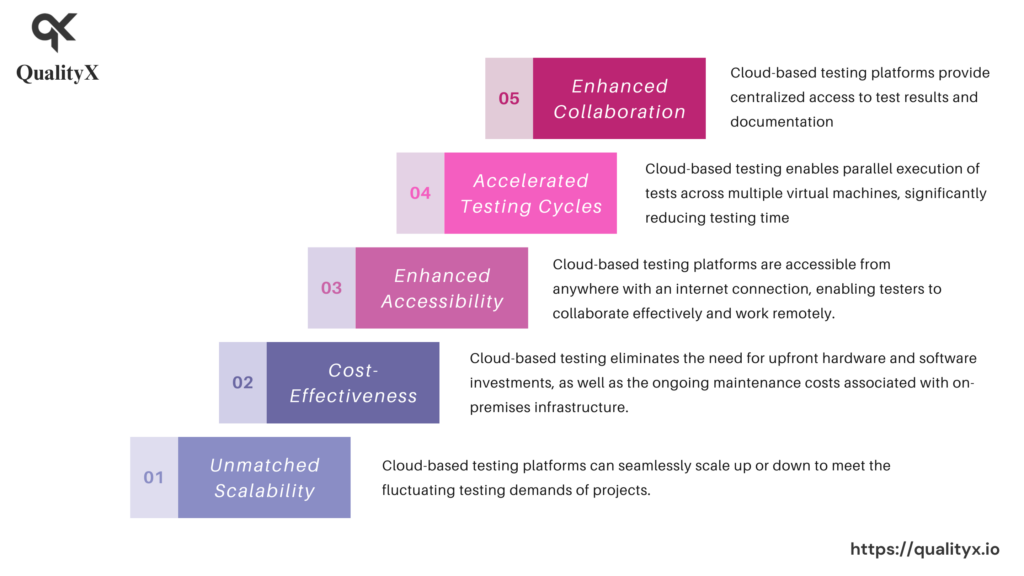Introduction
- A Comprehensive Guide to Unleashing the Power of the Cloud.
- In the realm of software development, testing plays a pivotal role in ensuring the quality, reliability, and performance of software applications.
- However, traditional testing methods often face limitations in terms of scalability, flexibility, and cost-effectiveness.
- Enter cloud-based testing, a transformative approach that harnesses the power of cloud computing to revolutionize the way software is tested and delivered.
Demystifying Cloud-Based Testing:
- Cloud-based testing is a methodology that utilizes cloud computing resources to execute software testing activities.
- Instead of relying on on-premises hardware and software infrastructure, cloud-based testing provides access to a vast pool of virtualized resources on-demand.
- This eliminates the need for upfront investments and ongoing maintenance, while providing testers with access to a wide range of testing environments, tools, and services.
Unveiling the Benefits of Cloud-Based Testing:

Benefits of Cloud-Based Testing
The adoption of cloud-based testing offers a multitude of advantages that make it an attractive choice for businesses of all sizes and industries. These benefits include:
- Unmatched Scalability: Cloud-based testing platforms can seamlessly scale up or down to meet the fluctuating testing demands of projects. This flexibility ensures that testers have the resources they need to handle testing workloads efficiently, regardless of the size or complexity of the software under test.
- Cost-Effectiveness: Cloud-based testing eliminates the need for upfront hardware and software investments, as well as the ongoing maintenance costs associated with on-premises infrastructure. This translates into significant cost savings for businesses, particularly those with limited budgets or fluctuating testing needs.
- Enhanced Accessibility: Cloud-based testing platforms are accessible from anywhere with an internet connection, enabling testers to collaborate effectively and work remotely. This flexibility is particularly beneficial for geographically dispersed teams, allowing testers to contribute from anywhere in the world.
- Accelerated Testing Cycles: Cloud-based testing enables parallel execution of tests across multiple virtual machines, significantly reducing testing time and accelerating the overall software development lifecycle. This rapid feedback loop allows developers to identify and fix defects early on, leading to higher quality software releases.
- Enhanced Collaboration: Cloud-based testing platforms provide centralized access to test results and documentation, facilitating collaboration among testers, developers, and project stakeholders. This transparency promotes a collaborative environment and streamlines the testing process, ensuring that everyone is on the same page.
Key Considerations for Cloud-Based Testing Success:
While cloud-based testing offers numerous advantages, there are a few key considerations to keep in mind when implementing this approach:
- Vendor Selection: Carefully evaluate cloud testing vendors based on their reputation, experience, security measures, pricing models, and support services. Ensure that the vendor aligns with your specific testing needs and provides the right level of expertise and support.
- Test Management: Implement a comprehensive test management system to organize, track, and analyze test results effectively. This will help you manage the testing process efficiently, identify trends, and make informed decisions about software quality.
- Data Security: Ensure that the cloud provider adheres to stringent data security protocols to protect sensitive information. Implement robust access controls, data encryption, and regular security audits to safeguard your data assets.
- Integration with Existing Tools: Ensure that the cloud-based testing platform integrates seamlessly with existing testing tools and processes to minimize disruptions. This will allow you to leverage your existing investments and maintain a consistent testing workflow.
The Future of Cloud-Based Testing: A Glimpse into Tomorrow:
- Cloud-based testing is poised to play an even more prominent role in the future of software testing.
- As cloud computing infrastructure continues to evolve and become more sophisticated, cloud-based testing platforms will become more powerful, versatile, and cost-effective.
- Additionally, the integration of artificial intelligence and machine learning into cloud-based testing tools will further automate and streamline the testing process. This will lead to even greater efficiency, predictive analytics, and proactive identification of potential defects.
Conclusion:
- Cloud-based testing has revolutionized the way software testing is conducted, offering a plethora of benefits that enhance the quality, efficiency, and cost-effectiveness of software development.
- By leveraging the power of cloud computing, businesses can streamline testing processes, reduce costs, and accelerate software delivery, ultimately leading to a competitive edge in the ever-evolving technological landscape.
- Embrace cloud-based testing and unleash the power of the cloud to transform your software testing practices and deliver software that meets the highest standards of quality and performance.
aiTest: A Closer Look
aiTest an all-in-one testing platform. This platform is designed to conduct comprehensive testing on your applications concurrently. It supports cross-browser and browser version testing, as well as functional and performance tests integrated with Analytics. Additionally, the platform incorporates automation features, including an LLM for effortless generation and testing of machine learning models and generating test data for the same. One-stop solution for continuous testing, integrating seamlessly with CI/CD pipelines. With support for multiple languages and specialized testing for AI/ML services, aiTest empowers organizations to speed up their release cycles while ensuring quality and reliability.


